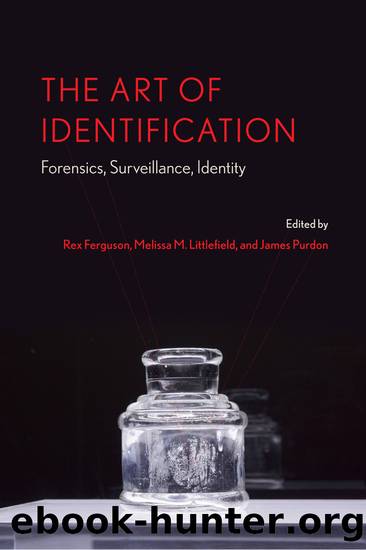The Art of Identification by Rex Ferguson;Melissa M. Littlefield;James Purdon;

Author:Rex Ferguson;Melissa M. Littlefield;James Purdon;
Language: eng
Format: epub
Tags: Identity (Philosophical concept) in literature—History, Identity (Philosophical concept)—History, Identifi cation—History, Identifi cation— Social aspects—History, Essays
Publisher: Pennsylvania State University Press
At the pancake breakfast where we had been filming, a red-faced veteran from WWII drew a bead on me and my crew, standing in line by the warming trays, our plates stacked high with flapjacks and American bacon.
âWhere are you from, anyway?â he asked, squinting his bitter blue eyes at me.
âNew York,â I answered.
He shook his head and glared and wiggled a crooked finger inches from my face. âNo, I mean where were you born?â
âQuam, Minnesota,â I said.
âNo, no. . . . What are you?â He whined with frustration.
And in a voice that was low but shivering with demented pride, I told him, âI . . . am . . . a . . . fucking . . . AMERICAN!â30
Here anyone familiar with Asian American novels or Asian American politics or living as Asian American recognizes the question and the assumptions underlying it. But Ozeki makes Jane the one in this interaction who is a âdementedâ nationalist. This encounter takes place shortly after Jane and her crew land at the local airport in the midst of Gulf War fever as soldiers are leaving on deployment. Her outrage is thus tainted by what this claim to being âa . . . fucking . . . AMERICANâ means. In earlier Asian American novels, taking a stand against the stereotype of the perpetual foreigner and against the claim that Asian American history is shorter than that of some White immigrant/hyphenated groups was prioritized despite the problematic implications of claiming oneâs identity as American and thus accepting imperial or domestic racist politics in making that claim.31 But here, Ozeki questions Janeâs momentary willingness to be as militantly American as someone with war-hungry, nationalist Gulf War fever. Ozeki then drops the issue of âclaiming Americanness.â Jane encounters the assumption that she is Japanese only when she is with her (actually Japanese) film crew and before she speaks in English. This has the effect of making the trope seem outmoded.
There are other ways in which Ozeki moves away from the traditional tropes of ethnoracial identity and protest to adopt those that are more biological and less overtly those of naming or categorization. First, it is notable that My Year of Meats is unusual in being a Japanese American novel with no internment narrative. In many earlier Japanese American texts, the loss of partly personal, partly public history is indexed by the internment, something unacknowledged in much of American history and often such a painful subject in Japanese American families that childrenâs questions go unanswered. But this is a Japanese American novel that does not mention internment. Janeâs mother is a war bride, not an internee. Janeâs biological connection to her racial ancestry is primarily a problem of personal biological production, not of reproduction of culture or recovery of history. She is not an interneeâs daughter but a DES daughter with a damaged fallopian tube and a high risk of early-onset, rapid-progression cancers. Jane wonders whether her mother might have seemed a natural candidate for DES because
Download
This site does not store any files on its server. We only index and link to content provided by other sites. Please contact the content providers to delete copyright contents if any and email us, we'll remove relevant links or contents immediately.
Never by Ken Follett(2879)
Machine Learning at Scale with H2O by Gregory Keys | David Whiting(2289)
Fairy Tale by Stephen King(2068)
Will by Will Smith(2041)
Hooked: A Dark, Contemporary Romance (Never After Series) by Emily McIntire(1957)
The Dawn of Everything: A New History of Humanity by David Graeber & David Wengrow(1570)
The Becoming by Nora Roberts(1330)
A Short History of War by Jeremy Black(1299)
HBR's 10 Must Reads 2022 by Harvard Business Review(1255)
The Strength In Our Scars by Bianca Sparacino(1244)
Go Tell the Bees That I Am Gone by Diana Gabaldon(1234)
515945210 by Unknown(1207)
Bewilderment by Richard Powers(1083)
This Family Does It by Kevin Sellers(1080)
443319537 by Unknown(1072)
The Real Anthony Fauci: Bill Gates, Big Pharma, and the Global War on Democracy and Public Health (Childrenâs Health Defense) by Robert F. Kennedy(1065)
How to Live by Derek Sivers(1064)
Works by Richard Wright(1018)
Going There by Katie Couric(991)
